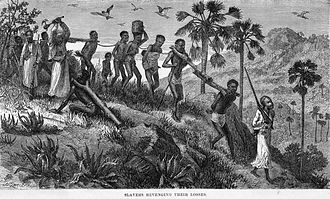Portal:Pan-Africanism
IntroductionWelcome to the Pan-Africanism portal!
Bienvenue sur le portail panafricanisme!     Pan-Africanism is a nationalist movement that aims to encourage and strengthen bonds of solidarity between all indigenous peoples and diasporas of African ancestry. Based on a common goal dating back to the Atlantic slave trade and the Trans-Saharan slave trade, the movement extends beyond continental Africans with a substantial support base among the African diaspora in the Americas and Europe. Pan-Africanism is said to have its origins in the struggles of the African people against enslavement and colonization and this struggle may be traced back to the first resistance on slave ships—rebellions and suicides—through the constant plantation and colonial uprisings and the "Back to Africa" movements of the 19th century. Based on the belief that unity is vital to economic, social, and political progress, it aims to "unify and uplift" people of African ancestry. (Full article...) Selected articleThe Black Panther Party (BPP), originally the Black Panther Party for Self-Defense, was a political organization founded by Bobby Seale and Huey Newton in October 1966. The party was active in the United States from 1966 until 1982, with international chapters operating in the United Kingdom in the early 1970s, and in Algeria from 1969 until 1972. At its inception on October 15, 1966, the Black Panther Party's core practice was its armed citizens' patrols to monitor the behavior of officers of the Oakland Police Department and challenge police brutality in Oakland, California. In 1969, community social programs became a core activity of party members. The Black Panther Party instituted a variety of community social programs, most extensively the Free Breakfast for Children Programs, and community health clinics to address issues like food injustice. The party enrolled the most members and made the greatest impact in the Oakland-San Francisco Bay Area, New York, Chicago, Los Angeles, Seattle, and Philadelphia. Selected biography
Molefi Kete Asante (/əˈsænteɪ/; born Arthur Lee Smith Jr.; August 14, 1942) is an African-American professor. He is a leading figure in the fields of African-American studies, African studies and communication studies. He is currently professor in the Department of Africology at Temple University, where he founded the PhD program in African-American Studies. He is president of the Molefi Kete Asante Institute for Afrocentric Studies. Selected history The Arab slave trade was the intersection of slavery and trade in the Arab world, mainly in Western Asia, North Africa, East Africa and Europe. This barter occurred chiefly between the medieval era and the early 20th century. The trade was conducted through slave markets in these areas, with the slaves captured mostly from Africa's interior and Southern Europe. Selected cultureThe culture of Africa is varied and manifold, consisting of a mixture of countries with various tribes that each have their own unique characteristic from the continent of Africa. It is a product of the diverse populations that today inhabit the continent of Africa and the African Diaspora. African culture is expressed in its arts and crafts, folklore and religion, clothing, cuisine, music and languages. Expressions of culture are abundant within Africa, with large amounts of cultural diversity being found not only across different countries but also within single countries. Even though African cultures are widely diverse, it is also, when closely studied, seen to have many similarities. For example, the morals they uphold, their love and respect for their culture as well as the strong respect they hold for the aged and the important i.e. Kings and Chiefs. Africa has influenced and been influenced by other continents. This can be portrayed in the willingness to adapt to the ever-changing modern world rather than staying rooted to their static culture. The Westernized few, persuaded by European culture and Christianity, first denied African traditional culture, but with the increase of African nationalism, a cultural recovery occurred. The governments of most African nations encourage national dance and music groups, museums, and to a lower degree, artists and writers. Selection of images depicting African culture
Selected imagesOrganisationsAll-African People's Revolutionary Party · African Society for Cultural Relations with Independent Africa · African Unification Front · African Union · African Queens and Women Cultural Leaders Network · Conseil de l'Entente · Convention People's Party · East African Community · Economic Freedom Fighters · Global Afrikan Congress · International African Service Bureau · International League for Darker People · Organisation of African Unity · Pan African Association · Pan-African Congress · Pan Africanist Congress of Azania · Rassemblement Démocratique Africain · Pan Africa Chemistry Network · Pan African Federation of Accountants · Pan-African Freedom Movement for East and Central Africa · Sahara and Sahel Observatory · UNIA-ACL · ZANU–PF
See also
& Festivals Photo by Helinä Rautavaara (1977) Publications
Films and TVAudios and videosDid you knowArchbishop Desmond Tutu and Thabo Mbeki, former President of South Africa. ... Selected quotesIn addressing the first ever conference of the Organization of African Unity (1st May 1963). The Gambian Pan-Africanist and nationalist Alieu Ebrima Cham Joof delivered the following message:
Pan-Africanism topicsCategoriesThings you can do
Related portalsAssociated WikimediaThe following Wikimedia Foundation sister projects provide more on this subject:
Discover Wikipedia using portals | |||||||||||||||||










































